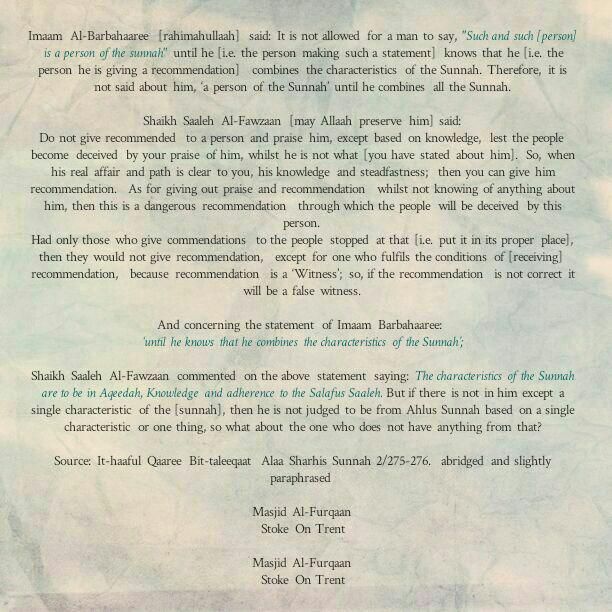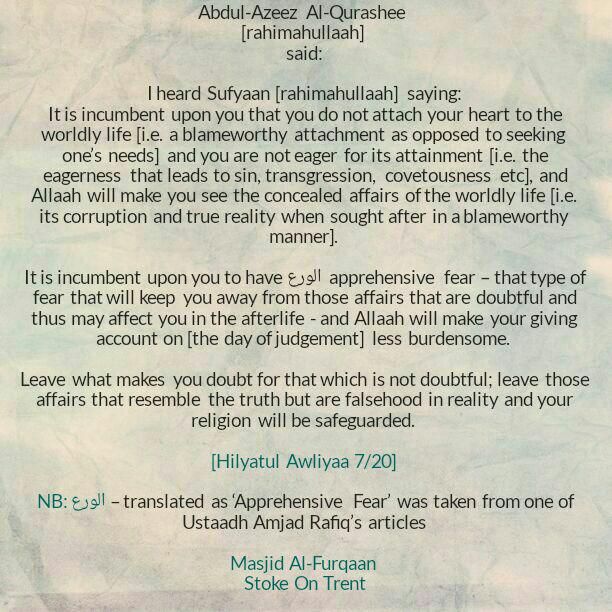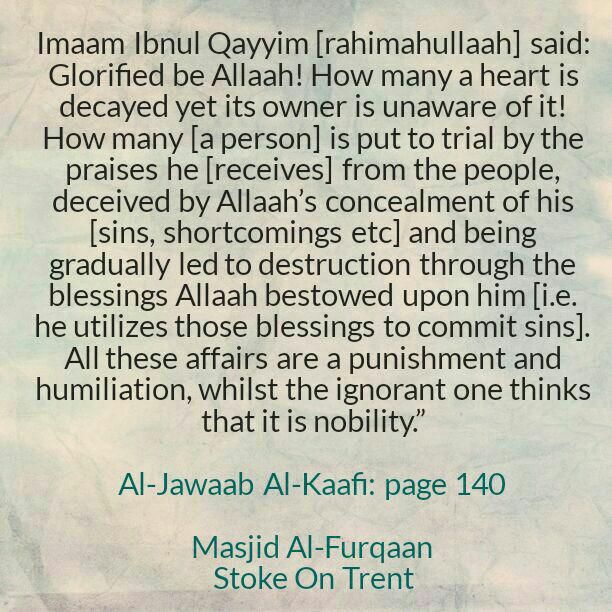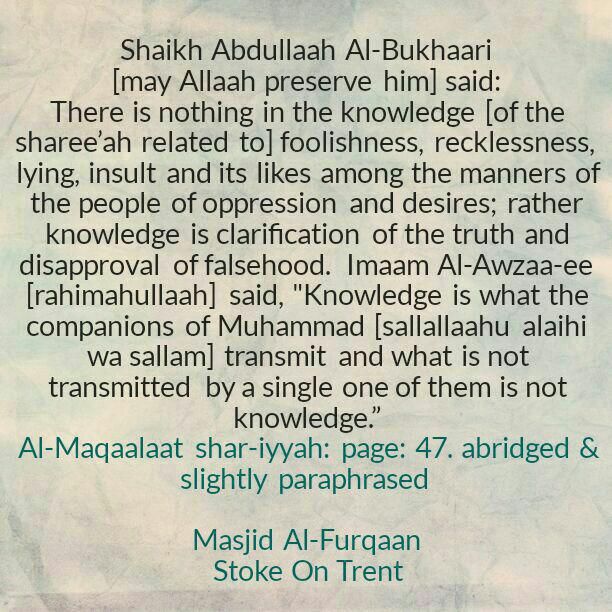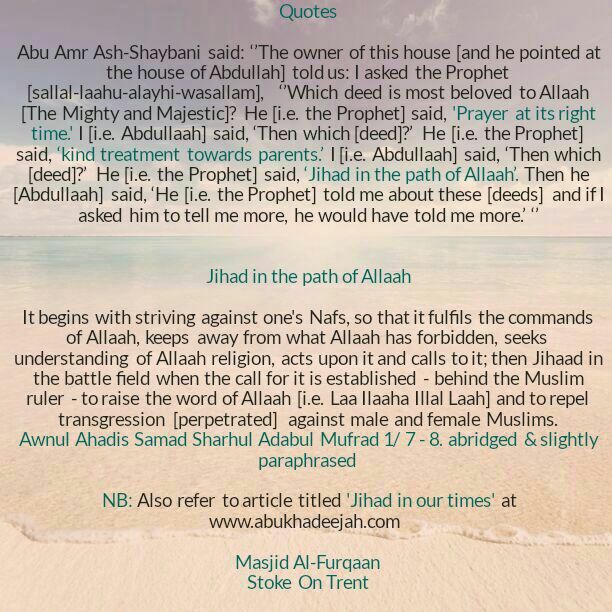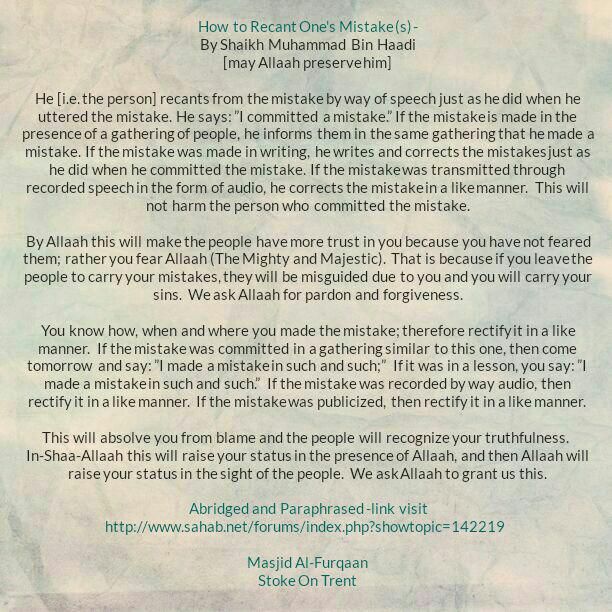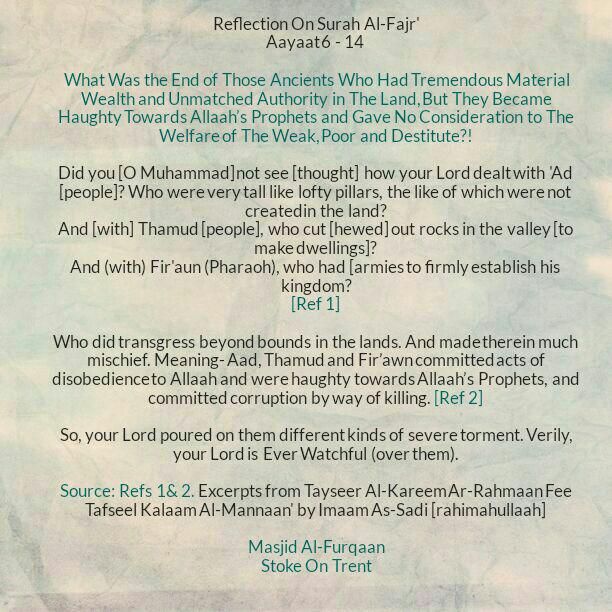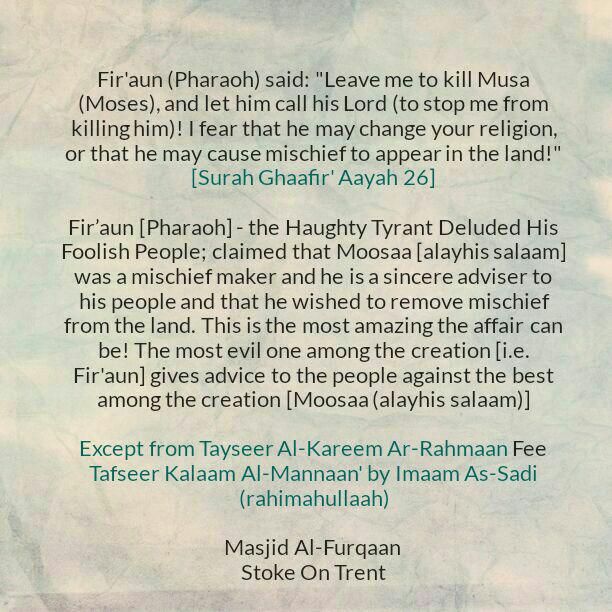In The Name of Allaah, The Most Merciful, The Bestower of Mercy


Abu Amr Ash-Shaybani said: ‘’The owner of this house [and he pointed at the house of Abdullah] told us: I asked the Prophet [sallal-laahu-alayhi-wasallam], ‘’Which deed is most beloved to Allaah [The Mighty and Majestic]? He [i.e. the Prophet] said, ‘Prayer at its right time.’ I [i.e. Abdullaah] said, ‘Then which [deed]?’ He [i.e. the Prophet] said, ‘kind treatment towards parents.’ I [i.e. Abdullaah] said, ‘Then which [deed]?’ He [i.e. the Prophet] said, ‘Jihad in the path of Allaah’. Then he [Abdullaah] said, ‘He [i.e. the Prophet] told me about these [deeds] and if I asked him to tell me more, he would have told me more.’ ‘’
Shaikh Zayd Bin Haadi Al-Madkhali [rahimahullaah] said: The intent behind the [name] Abdullaah is Abdullaah ibn Mas’ood [radiyallaahu-anhu].
The three deeds [mentioned] within this hadeeth are righteous deeds and whoever preserves them [i.e. acts upon them] -whilst he is a person upon Tawheed and sound Aqeedah – has indeed attained good in its entirely.
The first deed – prayer at its right time. Indeed, there is no doubt that prayer at its right time is the best of deeds. And the intent behind ‘Prayer at its right time’ is the prayer whose pillars, conditions and obligations have been fulfilled in the manner in which the Prophet [sallal laahu alayhi wasallam] performed it. [ref 1] He [sallal laahu alayhi wasallam] said: “Pray as you have seen me pray.”
The second deed- kind treatment to parents. It is among those obligatory deeds that are obligated on a son or daughter to fulfil as much as one is able- by fulfilling the commands of parents in that which is good [i.e. that which is not in contradiction to the command of Allaah and the Messenger (ref 2)], obedience [in good] and refrain from evil treatment and disobedience. Allaah [The Most High] said:
وَاعْبُدُوا اللَّهَ وَلَا تُشْرِكُوا بِهِ شَيْئًا ۖ وَبِالْوَالِدَيْنِ إِحْسَانً
Worship Allah and join none with Him in worship, and do good to parents.
[Surah An-Nisaa’ Aayah 36]
And Allaah [The Mighty and Majestic] said:
وَوَصَّيْنَا الْإِنسَانَ بِوَالِدَيْهِ إِحْسَانًا ۖ حَمَلَتْهُ أُمُّهُ كُرْهًا وَوَضَعَتْهُ كُرْهًا
And We have enjoined on man to be dutiful and kind to his parents. His mother bears him with hardship and she brings him forth with hardship.
[Surah Al-Ahqaaf’ Aayah 15]
And Allaah [Glorified be He and free is He from all imperfections] said:
وَوَصَّيْنَا الْإِنسَانَ بِوَالِدَيْهِ حَمَلَتْهُ أُمُّهُ وَهْنًا عَلَىٰ وَهْنٍ
And We have enjoined on man (to be dutiful and good) to his parents. His mother bore him in weakness and hardship upon weakness and hardship.
[Surah Luqmaan’ Aayah 14]
[Likewise], the Prophet [sallal-laahu alayhi wasallam] commanded us to treat parents kindly- he attached great importance to the affair and gave precedence to the rights of parents over Jihaad in the battle field. It has been reported that a man came to the Prophet [sallal laahu alayhi wasallam] and said, ‘’I want to fight jihaad alongside you?’’ He [sallal laahu alayhi wasallam] said [to the man]: ‘Are your parents alive?’ He [i.e. the man] said, Yes. He [sallal laaahu alayhi wasallam] said [to the man]: Then exert yourself in their service.’’’ [Bukhaari 3004/5972].
Therefore, the Prophet [sallal laahu alayhi wasallam] gave precedence to obeying parents and treating them kindly over fighting in Jihaad in the path of Allaah due to the greatness of the affair, and the obligation of fulfilling it in the most perfect manner- through deeds and statements- in pursuit of Allaah’s Pleasure.
The third deed – Jihaad. It begins with striving against one’s Nafs, so that it fulfils the commands of Allaah, keeps away from what Allaah has forbidden, seeks understanding of Allaah religion, acts upon it and calls to it; then Jihaad in the battle field when the call for it is established – behind the Muslim ruler – to raise the word of Allaah [i.e. Laa Ilaaha Illal Laah] and to repel transgression [perpetrated] against male and female Muslims. [Ref 3]
Source: Awnul Ahadis Samad Sharhul Adabil Mufrad Vol 1′ page 7-8. Abridged and slightly paraphrased.
Your feedback is welcomed to improve the content of this article Jazaakumullaahu Khayran
Ref 1: Reminder
Shuroot (Conditions of the prayer)
Arkaan (Pillars of the prayer– includes specific statements and actions)
Waajibaat (obligatory acts of the prayer- includes specific statements and actions)
Shuroot (conditions of the payer):
They are acts to be fulfilled before the prayer and should continue to be present during the prayer. They are nine in number:
1: Islaam – one has to be a Muslim.
2: Sanity.
3: Age of puberty.
4: One should not be in a state of Hadath [i.e. to be free from faeces, urine, sexual discharge by cleaning oneself and to be in a state of wudhu etc].
5: Entry time of the prayer [i.e. pray when the time of the prayer commences – not before or delayed without a valid legislated excuse].
6: Covering the awrah.
7: The place of prayer, body and clothing should be free from impurities.
8: Facing the Qiblah.
9: Intention [i.e. intending in the heart that one wants to perform that specific prayer (i.e. fajr, dhur, asr, maghrib or Ishaa)].
Pillars of the prayer:
They are the essence of the prayer. One must fulfil them again regardless whether they were left intentionally, wilfully or out of forgetfulness. They are fourteen in number:
1: standing if one is able.
2: Takbeeratul Ihraam [i.e. the opening and first takbeer of the prayer].
3: Recitation of Surah Al-Faatihah.
4: Ruku.
5 and 6: Returning from ruku and standing straight again.
7: Sujood on seven bones [i.e. nose and forehead should touch the ground, the two hands, the knees and the two feet].
8 – 9: Returning from Sujood and sitting between the two sujoods.
10: To be at ease [i.e. not rushing].
11: The final Tashahud.
12: Sitting whilst performing the final Tashahud.
13: Tasleem [i.e. to say As Salaamu alaykum warahmatullaah at the end the prayer].
14: To perform the prayer in the order it has been mentioned (i.e. 1 – 13)
The Waajibaat [obligatory acts and statements] of the prayer:
They are those actions and statements of the prayer that must be performed. If left intentionally, the prayer is nullified, but if left out of forgetfulness or ignorance, then sujood As-Sahw should be performed. However, the difference between the Waajibaat [obligatory acts and statements] and the Arkaan [pillars of the prayer] is that if any pillar is left, it has to be performed again, but if a Waajib of the prayer is left out of forgetfulness, then one only performs Sujood as-sahw. The Waajibaat are eight in number:
1: All the Takbeeraat in the prayer are Waajibaat besides the first one (i.e. the Takbeeratul ihram, which is a pillar).
2: The statement – Sami’allaahu liman hamidah is a Waajib for both the imaam and those praying behind him.
3: The statement Rabbanaa Walakal Hamd’ is a waajib for those praying behind the imaam only. As for the imaam or a person praying on his own, it is legislated for them to say it, but it is not waajib.
4: The statement Subhaanah Rabbiyal A’dheem in ruku is a waajib.
5: The statement Subhaanah Rabbiyal A’laa in sujood is a Waajib.
6: The statement Rabbi Igh’firlee when sitting between the two sujoods is a waajib; and finally 7 – 8: The first Tashahud and sitting whilst performing it.
[Source: Kitaab Al-Fiqh Al-Muyassar’ pages 72 – 78. Abridged and paraphrased]
Ref 2: Reminder
وَوَصَّيۡنَا ٱلۡإِنسَـٰنَ بِوَٲلِدَيۡهِ حَمَلَتۡهُ أُمُّهُ ۥ وَهۡنًا عَلَىٰ وَهۡنٍ۬ وَفِصَـٰلُهُ ۥ فِى عَامَيۡنِ أَنِ ٱشۡڪُرۡ لِى وَلِوَٲلِدَيۡكَ إِلَىَّ ٱلۡمَصِيرُ
وَإِن جَـٰهَدَاكَ عَلَىٰٓ أَن تُشۡرِكَ بِى مَا لَيۡسَ لَكَ بِهِۦ عِلۡمٌ۬ فَلَا تُطِعۡهُمَاۖ وَصَاحِبۡهُمَا فِى ٱلدُّنۡيَا مَعۡرُوفً۬اۖ وَٱتَّبِعۡ سَبِيلَ مَنۡ أَنَابَ إِلَىَّۚ ثُمَّ إِلَىَّ مَرۡجِعُكُمۡ فَأُنَبِّئُڪُم بِمَا كُنتُمۡ تَعۡمَلُونَ
And We have enjoined on man (to be dutiful and good) to his parents. His mother bore him in weakness and hardship upon weakness and hardship, and his weaning is in two years give thanks to Me and to your parents, unto Me is the final destination. But if they (both) strive with you to make you join in worship with Me others that of which you have no knowledge, then obey them not, but behave with them in the world kindly, and follow the path of him who turns to Me in repentance and in obedience. Then to Me will be your return, and I shall tell you what you used to do. [Surah Luqmaan’ Aayaat 14-15]
Ref 3: Jihaad in our times:
http://www.abukhadeejah.com/salafi-shaikh-fawzaan-on-jihaad-in-our-times-and-the-guidelines-of-jihaad-according-to-islam/

